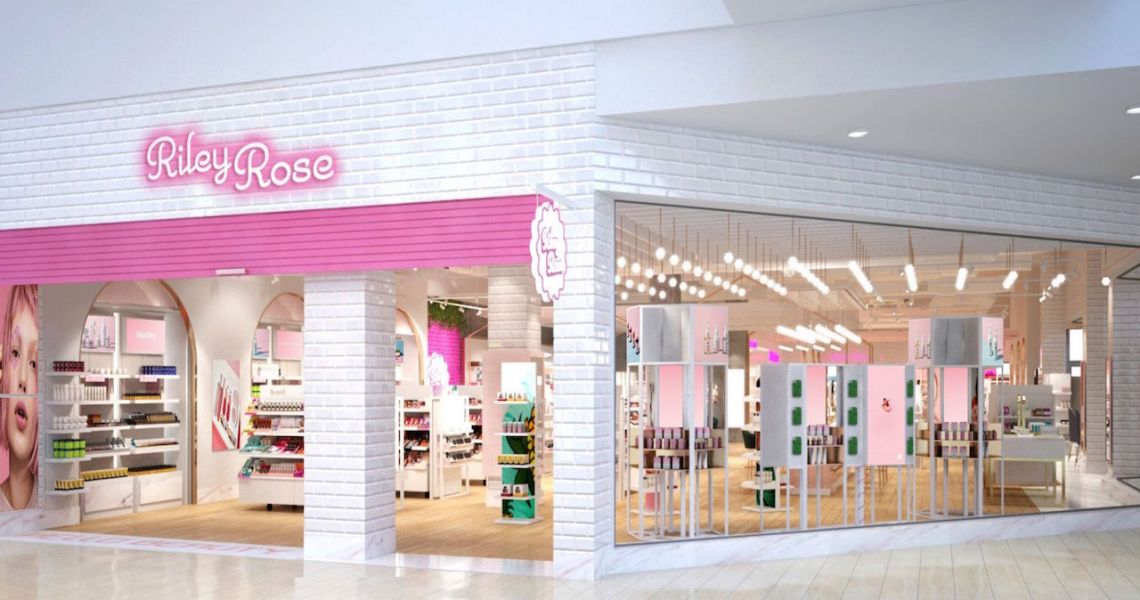This article is part of Glossy’s Beauty and Wellness Briefing, which features exclusive news, interviews with industry change-makers and behind-the-scenes looks at what actually matters. To receive the Beauty and Wellness Briefing and read for free, please subscribe.
Gen-Z retailer Forever 21 and its beauty counterpart Riley Rose are in a state of transition.
After initially trying to reorganize itself in Chapter 11 and refocus on its U.S. and Latin America businesses in September, Forever 21 sold to Simon Property Group, Brookfield Property Partners and Authentic Brands Groups for $81 million. Since November, advisers for the company reportedly contacted more than 115 potential buyers.
While Simon Property Group and Brookfield Property Partners have a smattering of Sephora and Bath & Body Works locations in their malls, their specialty is fashion retail. Authentic Brands, meanwhile, is best known for its licensing potential, through working with companies like Aeropostale. Forever 21 ran a significant private-label fashion business, but Riley Rose’s beauty reputation was built by buzzy brand partners like E.l.f. Cosmetics and Lime Crime.
With retailers including Riley Rose and Barneys New York struggling and falling off, beauty, wellness and lifestyle brands have the chance to exercise their power when on-boarding with a third-party retailer, meaning they can buck restrictive exclusive terms and demand more insight into the larger business.
“I think we are getting a surprise ending here. A couple of years ago, [Forever 21] was a growing retailer with a great story,” said David Tawil, president of Maglan Capital, a hedge fund that specializes in bankruptcy and restructuring. “Simon and Brookfield are not saving this company, and Authentic Brands is hodgepodge. They are thinking a lot harder about [what to do with] Barneys than if Forever 21 can be slapped on cosmetics or accessories.”
Prior to its store closures, Riley Rose built its roster of brand partners to some 500-plus companies. Now that the brand has transitioned to existing exclusively on Forever 21’s website, only 187 brand partners are listed, proving that a large number of beauty companies have ended their relationship with the company. Some still-onboard brands like Aether Beauty have icons indicating “low stock.” E.l.f. Cosmetics, while listed, has zero products displayed, suggesting it no longer supplies inventory to the company.
Riley Rose never had an exclusive breakout brand to establish itself as a destination, while Sephora (Fenty Beauty), Ulta (Kylie Cosmetics) and Amazon (Haus Laboratories) do. Tawil said that, today, all brands should be wary of exclusive terms, despite retailers trying to push them.
“You need to take the position that if you are a somewhat well-established brand, then the distribution platform needs to act as though it has leverage in your favor,” he said.
This is especially true when a company has e-commerce support, which in the age of DTC beauty, is almost always the case. Of course, wholesale relationships provide broader customer and marketing reach, but budding companies no longer have to be beholden to retailers’ guidelines.
Divya Gugnani, Wander Beauty co-founder and CEO, said, “Retail partnerships are part of a healthy omnichannel strategy. The right partnership allows your consumer the chance to experience your products in person, and it gives a brand the ability to reach a new customer and to access industry data and insight from the retailer lens. However, brands should always follow their North Star: their core customer. Creating a direct dialogue with your customer, listening to what she is asking for and delivering creates a relationship that eclipses retail trends.”
It is worth noting that Wander Beauty ended its partnership with Riley Rose before Forever 21 filed for bankruptcy last September. It sold with the retailer for less than a year.
From a more practical standpoint, Paula Rosenblum, co-founder and managing partner at Retail Systems Research, suggested that beauty brands require letters of credit from wholesale partners when retailers are changing hands (as is the case with Forever 21), and sign up for receivable insurance for inventory. That will ensure that the retailer’s payment to a brand will be received on time and for the correct amount.
“You can’t sit on the sidelines. Brands need to pay attention to the P&Ls and balance sheets of partners,” she said.
But not all brand partners are running for the hills in the case of Forever 21. CBD company Cannuka is sticking with Riley Rose, largely because the retailer’s content strategy has yielded sales, said Michael Bumgarner, Cannuka founder.
“If sales were not supporting the partnership, then we would have to make a business decision at that point, but that is not the case. We feel good about our sell-through rate, and we are learning so much about their customer. These insights are imperative due to the hurdles CBD brands still face in ramping up their own DTC strategies,” said Bumgarner, who explained that Cannuka has seen 650% year-to-date growth and less than 5% of its revenue came from its e-commerce site.
For those like Cannuka sticking with Riley Rose or any retailer at the brink of similar change, Rosenblum said direct shipping is a must, which equates to viewing the company as a marketplace versus a traditional retailer.
But more than anything Tawil said that brands, big and small, need to think of themselves as “content,” in the same way that movies and television shows do.
“Content is king, and customers today get their media from so many different outlets,” he said. “At the end of the day, the distribution channel is not that important anymore; the brand is.”




